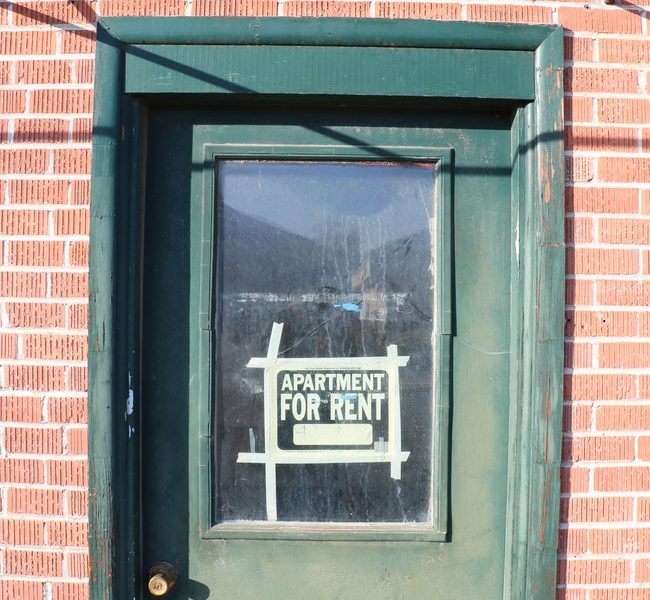
An apartment building in Vale advertises a vacancy. The most recent U.S. Census data estimates that nearly half of Malheur County’s homes – 4,197 – are rented. (The Enterprise/Liliana Frankel).
ONTARIO – The year 2020 was rough for renters, according to Priscilla García, housing programs manager at Community in Action.
The Ontario nonprofit normally helps about 100 families a year with rental payments. But since the start of the Covid pandemic, the caseload has ballooned to more than 450 families as people have lost jobs or work hours.
“We have (been seeing) households who’ve actually never applied for any type of assistance like this before,” said García.
According to the most recent U.S. Census data, nearly half of the homes in Malheur County are rented – 4,197.
In December, the Legislature extended several forms of state aid to families like those served by Community in Action. Most evictions are banned until July 1 with $50 million allocated to help families with rent payments.
And landlords also were offered some help, in the form of a $150 million fund from which they can seek 80% of the rent they are owed if they forgive the other 20%.
These measures were hailed by local housing advocates as important safeguards against homelessness.
“We’re super happy,” said Sara Montrone, an attorney with the Oregon Law Center.
In a change from previous legislation, which protected tenants automatically, the new eviction moratorium requires tenants to certify that they are unable to pay because of financial difficulties. If a tenant doesn’t sign, they can be evicted for nonpayment. This compromise has been the subject of critiques from housing activists at the state level.
“It’s not just a simple attestation. It has perjury attached to it” if tenants misrepresent their means, said Kim McCarty, executive director of the Community Alliance of Tenants of Portland. “All of our most vulnerable communities have a long history of receiving harassment when trying to access affordable housing and this just compounds those barriers.”
McCarty said she is worried that the new conditions will have a “chilling effect” on families seeking housing protection.
Also concerned about a “chilling effect” is state Sen. Lynn Findley, R-Vale, but his concern is for landlords. He worries they will be less likely to seek state financial aid given the condition that they forgive 20% of the back rent.
“I voted against (the bill) because it does not protect the landlords,” said Findley. “We were not able to introduce the amendment which would have allowed for a tax credit for the landlords so they would’ve been made whole over a five-year period.”
The proposal, which was backed by Republicans, failed in a special session of the Legislature last month.
According to Findley, the $150 million apportioned for landlord relief is far less than the total amount landlords are owed, which he estimated at about $300 million.
In Malheur County, however, both landlords and tenant advocates speak highly of their dealings with each other.
“You have landlords that are very, very understanding of a lot of households’ situations,” said García. “You just see a lot on both sides of this.”
“We have a good communication with the individuals that do rent the properties we have,” said Veda Bell, licensed property manager for Four Star Real Estate in Ontario. “What has been great is we have a great relationship with different agencies in the community – one we work with quite often is Community in Action. And I’ve been able to help renters get their intake applications to try to get assistance. That way, rent gets paid.”
Bell said that of 40 tenant-occupied dwellings that Four Star manages, only five families had been in touch to say that they were struggling with rent because of Covid.
“If (my renters) need to delay (payment) I do let them do that,” said Suzanne Mills of Mills Rentals in Ontario. But, she added, “Everything seems to proceeding as usual. Most of my renters are still working.”
Though census data wasn’t available specifically for Malheur County, statewide it is estimated that 126,056 families are not caught up on rent.
News tip? Contact reporter Liliana Frankel at [email protected] or 267-981-5577.
SUPPORT OUR VITAL LOCAL WORK: We provide Malheur County the local journalism that searches out the facts for you. SUBSCRIBE FOR $5/month. Click HERE.




